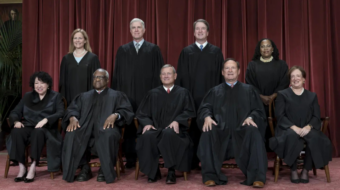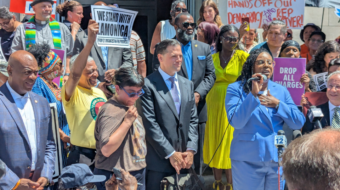WASHINGTON (PAI) – Can states use their own licensing laws to crack down on businesses that hire undocumented workers?
The Supreme Court wrestled with that question on Dec. 9, dealing with a 2007 law from Arizona – a measure that presaged the tougher anti-Hispanic law the same state passed two years later.
At issue in Chamber of Commerce vs. Whiting was whether Arizona could go beyond the 1986 federal immigration control law and pass its own law, yanking business licenses from those firms that hire undocumented workers.
The case is important because if the High Court lets states yank such licenses workers will get hurt, even if they are legally in the U.S. The case also produced an amalgam of “strange bedfellows” on the same side: Unions – led by the Service Employees – sided with the chamber, although for different reasons, against Arizona.
SEIU pointed out that Arizona forces business to use the federal “E-Verify” system to check if a worker is legal, even though the feds say E-Verify is only voluntary – and though SEIU, in another court, has shown the system is shot through with errors.
That compulsion is illegal, SEIU says.
The Obama administration also sided with the chamber, but for another reason: That federal immigration law pre-empts state laws. But early in the court’s session, Justice Sonia Sotomayor got Carter Phillips, the chamber’s attorney, to admit that Congress wrote that exception for state licenses into the federal immigration law.
“You don’t disagree that Congress at least intended that if someone violated the federal law and hired … undocumented aliens and was found to have violated it, that the state can revoke their license, correct, to do business?” Sotomayor asked. “Yes. I don’t disagree with that, Justice Sotomayor,” Phillips replied.
“So it really doesn’t matter whether they are revoking their right to do business in the state. And they can only revoke their charter or their articles of incorporation if they were filed in that state,” Sotomayor said.
But she then added that Arizona “wouldn’t have the power to revoke” the charter of a Delaware-based corporation to do business in Arizona even if it hired undocumented workers. “They can’t do it in Delaware, right,” Phillips replied.
Phillips pointed out that Congress intended the licensing exception to be very narrow, citing the friend-of-the-court brief – on the government’s side – that SEIU filed.
“The SEIU brief does a very nice job of explaining the particular focus of Congress, obviously, on the Agricultural Workers Protection Act – which has tremendous significance in terms of narrowing the state’s authority here,” Phillips told Justice Antonin Scalia.
That prompted a testy Scalia to retort that Congress “could have named that particular licensing scheme, if that’s what it meant.”
Justice Department attorney Neal Katyal, speaking for the Obama administration, stuck to the theme that federal law pre-empts all state and local immigration laws.
“State adjudication of a federal violation is expressly preempted as well as impliedly so for three reasons. The first is that Congress in developing IRCA in the comprehensive scheme set out a series of procedures, Federal adjudication with an ALJ, all sorts of different regulations to the jot and tittle. And what Arizona does here is what 40,000 different localities can do if this law is upheld,” Katyal told the court.
Arizona Solicitor General Mary E. O’Grady kept emphasizing the licensing exception Congress wrote into the 1986 immigration act.
“Through their police powers, states traditionally have the authority to regulate the conduct of employers…to determine what conduct warrants issuance of a state license and to determine what conduct justifies suspending or revoking such a license. Although Congress preempted some of our traditional authority when it enacted IRCA in 1986, it preserved significant state authority through the clause that permits a state to impose sanctions through licensing and similar laws,” she said.
SEIU Secretary-Treasurer Eliseo Medina, the son of immigrants, says the Arizona case, and the state’s use of E-Verify, once again shows the urgent need for Congress to step in and fix the broken U.S. immigration system.
“Our broken immigration system is a national problem that needs a national solution. Arizona’s mandatory E-Verify law is yet another costly and ineffective band-aid,” Medina said. “A 50-state patchwork of regulations hurts communities, workers and is bad for business. The E-Verify program has been plagued with flaws and errors from the beginning…We hope the Supreme Court will recognize Congress intended the federal government to govern immigration policy. Fifty states acting alone cannot do it.”










